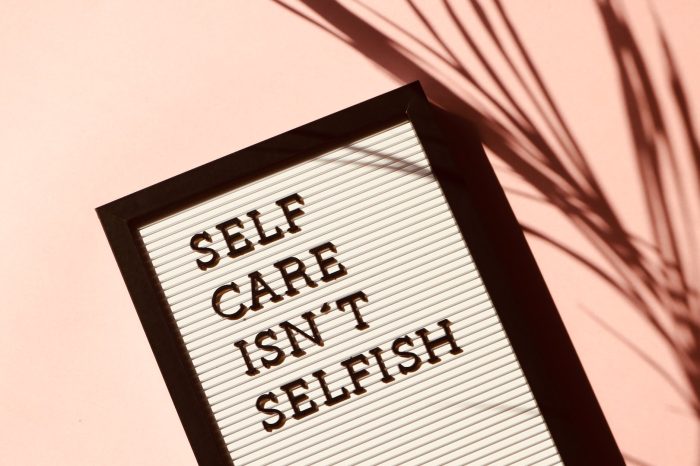As someone that suffers from anxiety, I understand the fears involved with confrontation. I feel that it’s not the fear of confronting, but also the anxiety building up to actually doing it. In the past, as a pet parent, I would worry weeks before my pet’s physical, thinking about all the small issues we’ve encountered during the year, leading up to the annual checkup. I would dread the doctor telling me about possible health concerns about my pet and this was because I worried about losing her due to any mistakes on my part. I’ve done the same with my own appointments, sometimes, to the point of making myself sick as an excuse to avoid going out!
Basic confrontation, or making a decision for yourself is something I still struggle with. I seldom go out with a group of friends or colleagues because I know, I will give into their demands just to “go with the flow”. Doing so has caused me issues in the past, but I ignore them and continue to behave this way. I know in the back of my mind that I’m doing myself a disservice, and still nothing changes. My worries always include thinking about how others would feel if I took a stand for myself. This lead to people assuming that I was a pushover, that they could always manipulate me into doing things their way. Unfortunately, it proved true many times.
As a patient, this would be a common topic of discussion. My therapist always tells me that while it’s a good practice to think about others, in certain situations, it’s important that I put myself first. Doing this isn’t being selfish because at the end of the day, the person that knows you the best, is yourself. This idea is what I have always struggled with. While it takes root in my up bringing, it’s something I partially struggle with even today. As the elder in two daughters, coming from a traditional Indian family, it has been ingrained in my mind that I must only think of others. I feel at times, had I been a boy, it might have been different.
As I got older, this behavior resulted in frustration and anger towards the people that always expected me to behave like a “carpet,” and as my therapist constantly reminds me, it’s better to confront than to harbor these feelings. I have learned that speaking up for myself isn’t a negative habit. Instead, it shows character and confidence. Through the years, I have learned ways to handle confrontation with confidence and that is what I want to share with those of you that find yourselves in my shoes.
One thing I have always kept in mind is that feelings aren’t problems that can be solved. You can’t expect people to change the way you feel about something because that is in your hands. Only you can change your mindset. Instead, when trying to solve an issue like this, writing it down and listing the reasons behind such feelings help in clarifying the issue. Likewise, think about what you expect from others. If you want someone to show you respect, start off by doing the same. Use words that show you respect their decisions, or be polite and use manners. If you’re expecting affection and attention, start off with showing affection and appreciation as well. People mirror behavior and if you start off with positive behavior, you can expect it to be reciprocated as well. There will be times when this will fail. You might come across a person that refuses to stand down and will constantly keep attacking you.
In this case, I’ve learned two things: 1. Ignore them because it’s an intentional attack. The person knows that if they attack you emotionally you will falter and because we know that is their intention, we stop it in its tracks. 2. Do something to show that you’re strong. You don’t need to attack them back because it’ll show that you’re easily instigated. Always remember, you’re bound to make a mistake if you act out of pure emotion; you need to rationalize what you want to do. Try to understand what the person wants from you. I’m not saying to give in, but once you realize what they want, you can take a stand.
You need to understand that there’s a “right” time and place to confront someone. If you’re planning on calling someone out while they’re at work, or preoccupied, chances are, your point is not going to come through. Instead, it’ll look like an immature plan to upset someone intentionally. If you want to maturely handle a situation, think about the time and place. If a problem is worth sitting and writing about, then plan thoroughly. Think about a time and place that would work for you and the other person. Also, make sure that you are CALM before the confrontation. If you’re worked up, you’ll wind up being too defensive. You also don’t want to be too relaxed because being passive will put you back where you started. Be calm and think about what points you want to bring up in the conversation. Don’t think of it as a confrontation where it’ll turn into a fight, but instead think of it as a conversation to resolve a problem.
Show maturity in the confrontation by taking ownership of what you can. If realize that the person has a valid point about something that you do, then take ownership. This results in lessening the tension during a confrontation and moves it one step towards a resolution. Remember, there’s nothing wrong in taking ownership. It shows responsibility and maturity. Also, it’ll give you something to take away from the conversation and help you improve yourself as a person. But that doesn’t mean that you constantly apologize for everything. Giving in to someone to calm them down, will hurt you in the future. You’ll move the conversation back towards where it started: you being manipulated or walked over because you avoid conflict.
Next, do not turn the confrontation into an argument or a competition. The idea is to resolve a conflict. By trying to “one up” the other person, all you will wind up with is more fire. You don’t want to fuel an argument. Another thing to keep in mind is that history belongs in the past. By bringing up moments from older arguments, you will change the direction of the conversation into something without a direction. Why? Both parties will be too busy in digging up old history. Again, the focus is mean to be on the current problem and how to resolve it. Stay focused! If there’s something you both agree on, then acknowledge it! You don’t want to spend all your time trying to counter every argument in the conversation. Take a step back, and listen to what is being said and if you agree with it, then mention it!
In the past, I wasted time in trying to push out all the instances where I’ve kept quiet and let the other party manipulate me. I felt that if I made a longer list in comparison to what I would expect from them, they would feel guilty about being in the wrong. Did it work? Nope. Instead, I was left with hurting the other party and having a one sided conversation where I felt that I was manipulating them to behave how I want. We can’t control anyone’s behavior but our own. Make the conversation productive by thinking about how you both can improve the situation.











Read 0 comments and reply